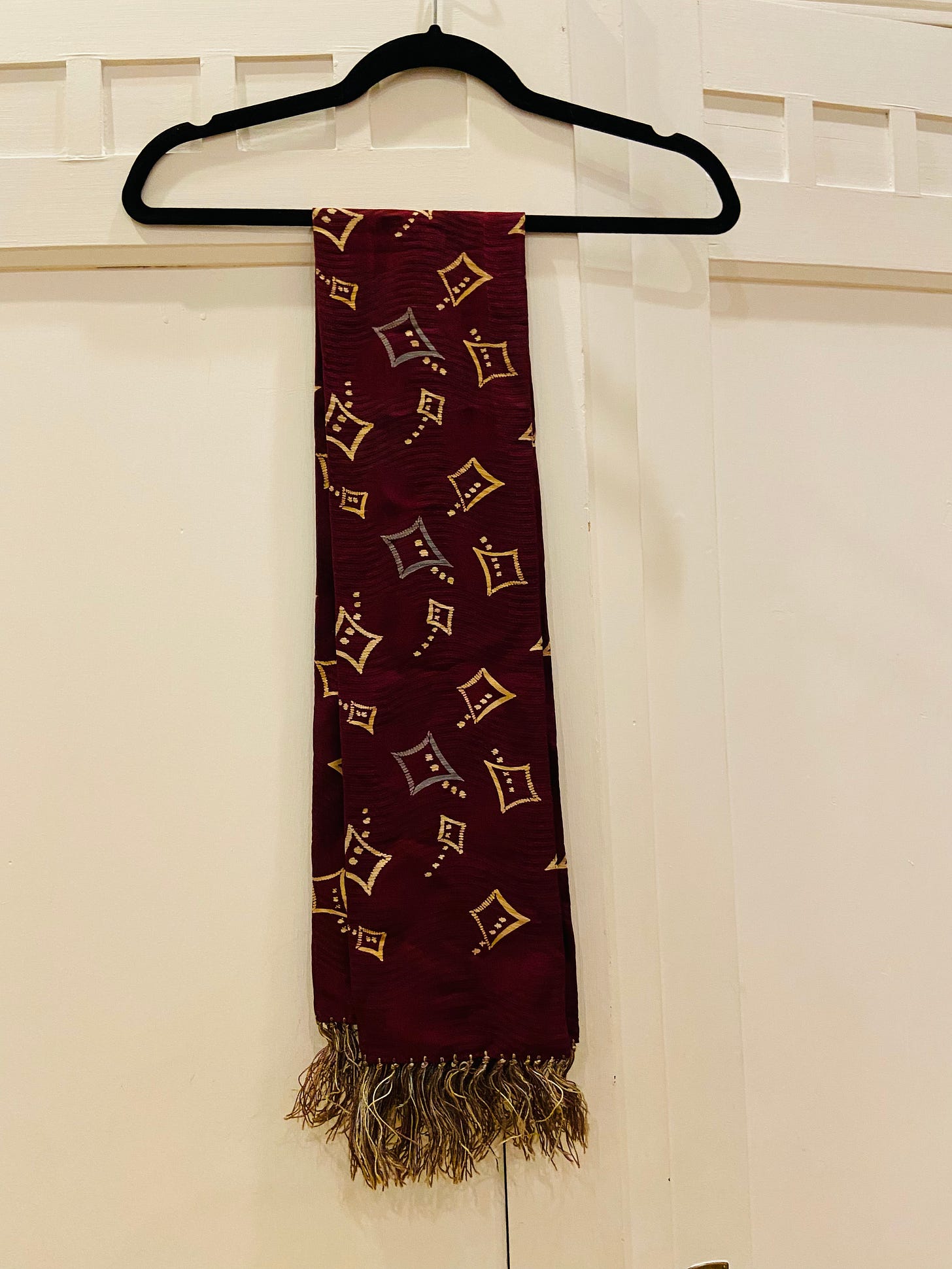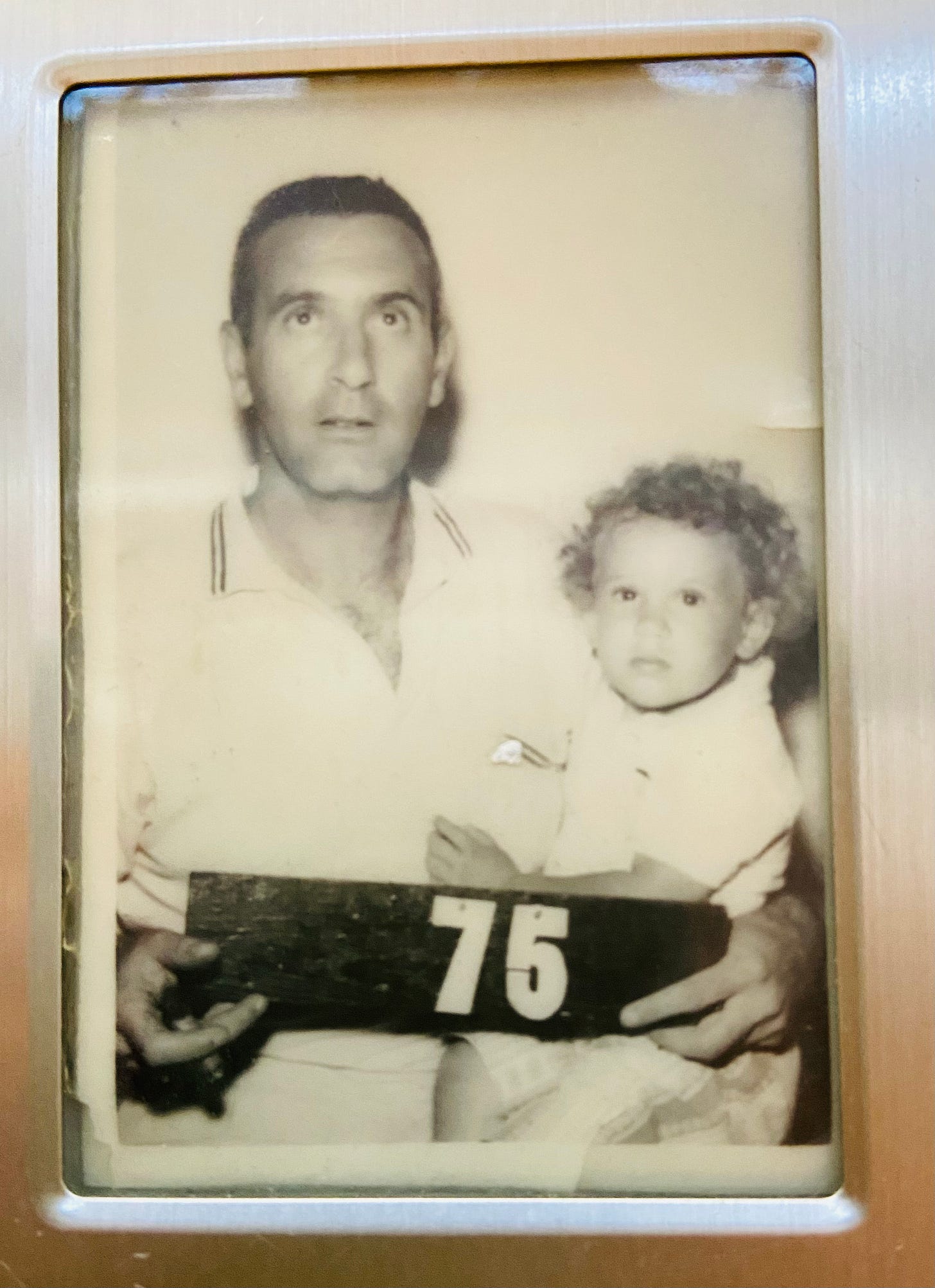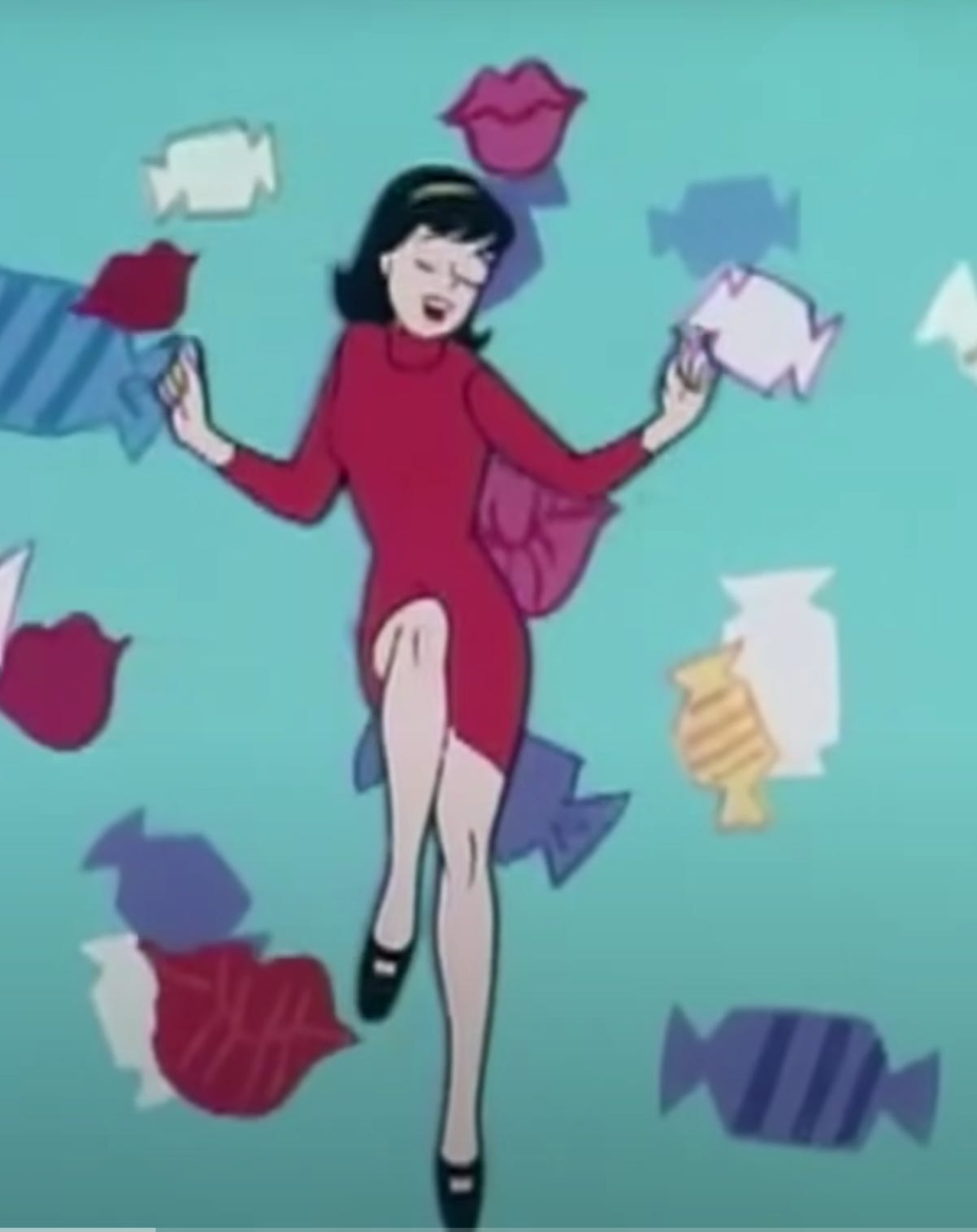Wrapped around my heart.
I wrote and published this story two years ago when the world felt way more black and white than it does now. I’ll write a new one soon (I’m SO slow!) but for now, maybe this will resonate. xx
With the sigh of someone who’s out of excuses, I open the cabinet. Baskets lay around on shelves, like hungover drunks, overflowing with the accessories they’re supposed to be neatly containing. The strap of a handbag drapes lazily from one basket and a long-forgotten scarf cascades over another; a paisley waterfall run amok. A third contains a snarl of tights, fishnets and stockings, piled higher than the spaghetti plate in Strega Nona. I shudder. No wonder I’ve been avoiding this.
I grab a basket from another shelf, this one filled with scarves. I put a couple in the Yes pile, but most are No’s. A faux-fur clutch has found its way into this mess and I pick it up to reveal a raw silk scarf that I recognize instantly.
I hold it to my face, and while it no longer has a scent, I remember how it smelled - of cold air, and a whiff of cigar smoke laced with Sen Sen. I thought its pattern looked “jazzy” when I was little, although I wasn’t sure what that meant. When my father tucked it inside his overcoat, he looked more like a TV dad going off to an office than a principal on his way to a school.
His returns from work alternately filled the house with joy or tension, depending on his mood. He was the handsome, opinionated, smart, funny, sun that our world revolved around.
I gather the scarf’s fringes in my fingers, like rice at a wedding.
I can almost feel the way they tickled my forehead when he bent to kiss me at the end of the day, just as my curls tickled his chin when he taught me to read Hebrew. I’d sit on his lap, slowly reading right to left and laughingly, he’d flatten my hair with the palm of one hand, as the finger of the other followed along, tapping a word if I got it wrong.
Our swim club ID card
The TV is on Mute and I can’t bear looking, but can’t not see the captions - Massacre. Torture. Rape. Beheadings. Unfathomable. And yet.
I uncurl my fingers and the fringes hang in the air, as untethered as I feel.
I can’t help but think of the fringes of my father’s other scarf - his tallis - and how comfortable he looked with it draped around his shoulders. Other people at synagogue hummed and murmured along, but my father’s Hebrew was clear and his voice was strong, and it made me proud.
We went to shul on Friday nights, which I mainly liked because I got to twirl around in a dress beforehand. I’d polish my patent leather shoes with vaseline before dinner, as the smell of roasted chicken and caramelized onions filled our house.
When I got a little older, I loved Saturday mornings because my brother was the Chosen Person who got to march off to shul with my father and I got to stay home. With the rec room to myself, I glorified in singing along to The Archies in the British accent I used for rock and roll. Like Veronica, I loved The Pony.
In Junior High, I started wearing a back brace to treat the scoliosis that had recently been diagnosed. One night, after my allotted hour out of it, I put the brace back on, and assessed myself in the mirror. It was hideous and so was I. I turned away. “I hate it,” I thought, and said it aloud. I cried harder than usual, spitting “I hate it,” through clenched teeth, as I unstrapped the brace and yanked it off. I banged it against the floor, trying to break it. And then felt a presence at the door.
My father reacted the way someone who grew up without money would.
“That brace is expensive and there are kids who can’t afford them. Don’t you ever let me see you doing that again,” he said. “Now put it on,” he added, as he turned to leave.
I glared, waiting for him to go, but he stayed, with his back to me. When he turned, there were tears in his eyes. “You have to wear it because it’s gonna make you better,” he whispered. He lifted my chin with his finger and said something he didn’t say often - “I’m sorry.” I had never seen him cry and the choke in his voice choked my heart. He looked down, then fixed me with his eyes and said, “I’d wear it for you if I could, Baby.”
The next night, he came upstairs as I brushed my teeth. “Did you do your exercises yet?” he asked.
I hated my spine exercises, especially sit ups, which were hard because of the brace. He sat and watched as I did a few, trying to keep my feet from popping off the ground while lifting my torso toward the ceiling. The bedsprings squeaked. He stood, then knelt, and wrapped his hands around my feet. He held them to the ground as I lifted my metal-covered body upward.
“That’s it,” he whispered. “Now do another… and another…one more.” When I got to five, I shifted my gaze from the ceiling to him. He nodded. “You’re doing it,” he said, then added, “let’s do five more.” I said I couldn’t and he said I could. And so I did.
He appeared at my door at 9:45 the next night and the one after, and we’d take our positions. As I raised my body toward the ceiling, he’d whisper, “One. Two. There you go…three.” At the end of the week, when he got to ten and I laid back, he said, “Eleven.” And when I brought my head up, he kissed it.
By high school, my synagogue attendance tapered off, but not my father’s. He looked so comfortable, walking off, in his suit and tie, his velvet tallis bag at his side. I once asked if he knew the meaning of the Hebrew words of the Amidah, the silent prayer. He shook his head and laughed. “I just read them,” he said. I asked, in that case, what it was he actually got out of being there. He answered without hesitation.
“It gives me an hour of quiet every week. An hour to think about what kind of father and husband…what kind of person I’ve been.”
“So you go to shul to keep yourself in line?” I said, a bit of teenage smirk sneaking into my tone.
“That’s exactly what I do,” he said, leveling me with the eyes that didn’t tolerate smirk, teenaged or otherwise.
It was so simple for him. Good. Bad. Right. Wrong.
On High Holidays, we’d sit in the same row we always did; Jews know each others’ pews like high school kids know each others’ lunch tables. I’d turn around and wave to friends, and during the Torah reading, my mother got up to chat with the ladies in the lobby.
My father would give me a little smile and tilt his head and I’d slide over. Without missing a word of the blessing, he’d drape his tallis-covered arm around my shoulder. One gesture, and the world went from cold to warm. We sang, and the sad, sweet melodies washed over us. Softened us. Connected us.
My father’s tallis, like his world-view, was black and white.
The jazzy fabric in my hands is less simple, its colors, more nuanced, its pattern more chaotic. Much like the world we live in. Except that my father’s scarf is beautiful.
He wore it when he drove me to the train station during my college years, insisting on waiting with me on the platform.
“How’s school?” he’d ask. I’d say it was good and we’d stare ahead, our silence an uncomfortable contrast to the laughter and chatter of people around us. Strict fathers and rebellious college daughters don’t exactly have easy banter. He was having back trouble of his own at that point, and standing was even more difficult than conversation. But stand, he did.
When the train arrived, he’d hug me and tell me to be good. When I took my seat on the train, I’d look out the window, and there, amongst the hugely puffy down jackets, was my father’s jazzy scarf. It hung around his neck as he did the thing that hurt his back most - bending. His eyes searched the passengers until he found me. We smiled and waved - nothing separating us but a pane of glass.
When the train started moving, he straightened his back and tried not to wince.
I want to fold the scarf and lay it down gently. But I can’t let go of it.
So I kiss it. And hug it tightly. And yearn.
For the security of my father’s broad shoulders. The clarity of his voice. His arm around my shoulder.
The horrific TV captions keep scrolling. I’m glad he’s not here. But wish that he was.
Because he would grab me by the ankles and keep me grounded.
And level me with his eyes.
And make me feel safe.
In a world that is anything but.




What a great father.
Just stunningly heartbreaking Debra. Beautifully told.